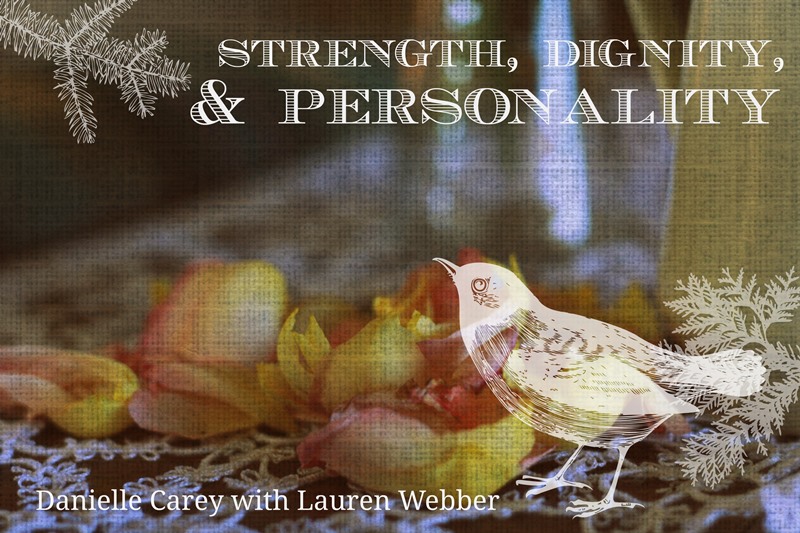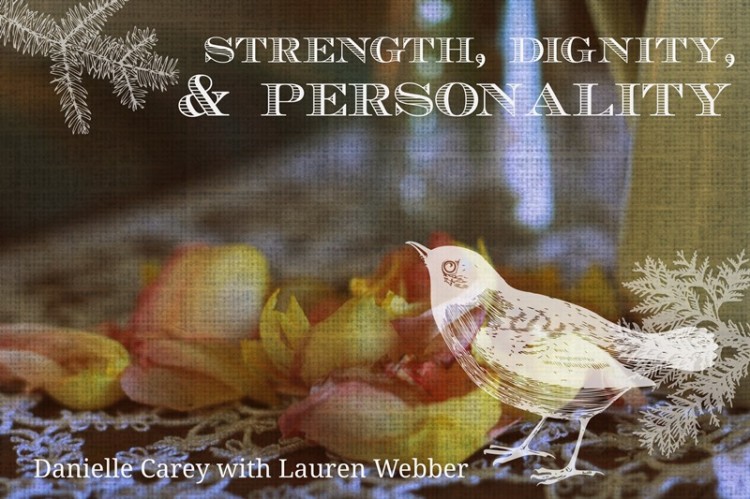Strength, Dignity, and Personality
Recently my sister Lauren and I sat down to nut out our thoughts on personality types in relationships. We come at things from different angles. From the outside, Lauren resembles a typical introvert. She’s quiet, content to stay in the background, and has a gentle demeanour. Yet her chilled exterior hides a fiercely people-oriented perspective: Lauren, a self-described introvert, nevertheless lives in people time. She lives in a shared house with her husband, two small children, and two other married couples, not to mention a dog and five pigeons – and she actually likes it. Meanwhile, seemingly at the opposite end of the spectrum, I love conversation, enjoy meeting strangers, and I suspect I rarely come across as shy. But I don’t like big parties, can’t imagine sharing a house with someone I’m not either related to or in a relationship with, and often sneak away for a snatch of quiet time when we have guests staying.
Lauren and I have been laughing together about the current flurry of internet memes that have popped up in tribute to introverts. Lauren remarked on how introverts are generally painted as a precious treasure, while extroverts seem to exist merely to annoy introverts. We laughed, and while a lot of factors go into such discussions (one of the primary ones being that those with introvert tendencies also seem more likely to be articulating their thoughts on the internet; hence, the proliferation of memes), we couldn’t deny the truth. All the information points to the care and feeding of introverts, while extroverts are left a little out in the cold. Lauren wondered aloud at the imbalance. “Isn’t there a place,” she mused, “for introverts to sometimes have to step out of their shell in order to serve extroverts?”
For Lauren, who lives in community in the most literal sense, this isn’t just pleasant speculation. Her words actually mean something. Sharing a house between six adults – all of whom have their own work and study schedules, their own families, their own guests, and their own marriages to look after – means that no matter how social you are, you will need your own space at some time or other. But just as true is the reality that someone might need you just when you are needing space. It’s as simple as one housemate having had a crazy day and needing to recount it minute-by-minute, while another housemate wants nothing more than to vegetate in front of Little House on the Prairie reruns. At its most basic level, this is a personality clash, and it’s no one’s fault.
If you are the introvert in this scenario, you probably think that the extrovert needs to back away and vent somewhere else. If you are the extrovert, you need the introvert to give you some time just to work the day’s drama out of your system, and then you can leave them in peace. The temptation, when we discover our personality types and which categories we naturally fit into, is to give ourselves special consideration, to assume that our personalities exempt us from sacrifice. But as Christians, our feelings about the other person – and this is convicting, wrenching to write – should be for their best interest, not for how they can fulfill our needs or respond best to our personalities. This will sometimes mean that in spite of our natural desire either for space or nearness, we might have to give just the opposite.
This sounds obnoxious and painful – and also suspiciously as though personality types are irrelevant. What place, then, is there for understanding our personalities? For one, knowing who we are and how we naturally work can help us to understand why we respond the way we do, and why we can feel loved or disconnected, recharged or drained, depending on the circumstances of our relationships. Knowing how we work can also help us to plan ahead. If you’re an introvert, plan quiet time into your life so that there is space for people-time with those who need it. If you’re an extrovert, consider the people who can recharge your batteries without feeling drained themselves. Put yourself on a timer when you’re with your introvert friends; consider their space and their needs, and allow time for them to unwind. We won’t be asked to be our opposite selves every day of our lives, but if we work our particular needs into our lifestyles, it allows freedom to be able to put aside our natural tendencies when the need arises.
This is not new information. It’s just a fresh consideration of the concept the Bible calls ‘dying to self.’ (Romans 12:1; Galatians 2:20). The very phrase is terrifying; none of us wants to die on any level, because dying usually hurts. But we have an example in the man Jesus, who crucified himself once for all on the cross, and yet laid down His self every day in love for the people around him. We see one simple example of this in all the times that Jesus is praying and the disciples come along to ask Him some fairly inane questions. Prayer is an introverted activity, a recharging activity, and it’s a holy activity – particularly when the one doing the praying is the Son of God, and the person He is praying to is God, His Father. In a weighted comparison, holy prayer should win out over ridiculous questions any time – or so it would seem. But Jesus paused His communion with God in order to have community with the flawed, needy people around Him.
This is an incredible example, but it also sounds a little overwhelming. As encouragement, Lauren points to the picture of the Proverbs 31 woman, who is clothed with strength and dignity, who can laugh at the time to come. Strength and dignity are qualities that do not exist in isolation; they exist in community. Dignity and strength shine when they are spent in relation to others. A woman has dignity when she knows who she is and has the confidence to be that person, authentically. A woman shows strength when she has the discernment and courage to respond to who others are, when she steps out of her comfort zone for those who need her. Discernment and courage rely on the Holy Spirit’s guidance and instruction, and to that end, we must be in relationship with God in order for these qualities to develop.
Personality types cannot be an excuse not to serve or not to love. Knowing ourselves and understanding our personalities sets us free to be more fully who we are, to live honest and authentic lives. But knowing Christ takes us one step further, helping us to be more like Him so that, regardless of our introvert or extrovert tendencies, we may live more fully in love.



You are indeed a blessing to your GENERAtion!!!!!!!!!! Thank you for your website. Its just what I was looking for. I love inspiring youths and i have a strong passion to help them in self discovery!!! I know everyone is UNIque in their own way! Once again thank you!!!!!!!!!!!!!!
I love it! This is so spot on… and reminded me of a situation I had at church. I was a few months new at a church but knew one of the deacons from college, as he was the person who went over my personality and career tests with me. I barely entered the fellowship luncheon and he walked up to me, taking me by the arm, walking me across the room, and whispered in my ear, “Come make these people feel welcome. They are new.”
You see, I’m an extrovert, so people automatically think I’m comfortable making people feel welcome on the spot. Little did he know I was very uncomfortable and barely got through the conversation.
So it just goes to show that you don’t really know a person, until you really KNOW a person. 😉
The last paragraph said it all. I’m glad you touched on the fact that we shouldn’t use our personalities as excuses. I’m also glad that you touched on “dying to self”… not something most of us want to think about but it’s what Jesus wants us to do; each day! More of Him, less of me. 🙂
This is SO GOOD! Thank you!!!
As someone who is married to an extrovert– I love this at a very deep level. And I’m learning, slowly, over time, to be more extroverted. And guess what? It’s not the end of the world. It’s actually quite pleasant. Ha! 🙂